Does your chicken love fruits and vegetables? If so, consider giving them pineapple as a special treat. But can chickens eat pineapple safely? The answer is yes, but there are a few things to remember.
Pineapple is full of nutrients that are good for chickens. It has vitamins A and C, which help boost the immune system and keep your chicken healthy. It also contains minerals such as magnesium and potassium, which help with muscle growth, egg production, and digestion. Additionally, pineapple is high in antioxidants which can help protect against certain diseases.
This article will discuss the safety considerations that should be taken when feeding chickens pineapple and how to prepare it for your feathered friends properly.
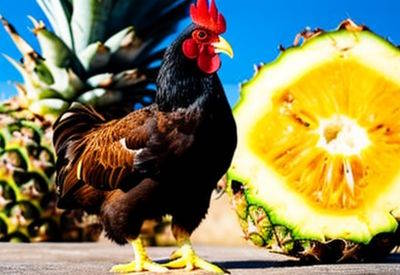
Can chickens eat pineapple?
Chickens can safely eat pineapple in moderation. The small amounts of sugar and the acids found in pineapple are not toxic to chickens. However, like all foods, it should be given in moderation and not as a staple part of their diet.
The flesh of the pineapple is safe for chickens to eat, providing them with lots of nutrition. However, do not feed the skin or core to your chickens, as these parts contain hard fibers that could be difficult to digest.
You should also only feed them pineapple as an occasional treat because it is high in sugar. Too much sugar can lead to health problems in chickens, just like it does with humans.
[ChickenAffiliate]
The benefits of eating pineapple for chickens
Everyone knows that chickens love their treats, and pineapple is no exception. There are quite a few benefits to feeding pineapple to your chickens. Let’s look at what makes this tropical fruit a great addition to the chicken coop.
Vitamin C Boost
Pineapple contains high levels of vitamin C, which helps promote healthy development in chickens. This vitamin also helps boost their immune system, so they can better fight off diseases and illnesses.
Improved Digestive System
Pineapple is high in fiber content which helps stimulate the digestive system and improves the absorption of essential nutrients from other foods chickens eat. This helps them stay healthy and strong.
Weight Control
The high fiber content in pineapple also helps chickens maintain a healthy weight by keeping them fuller for longer periods and reducing their overall food intake.
Taste Treat
Chickens love the sweet taste of pineapple, and it can be used as an occasional treat or reward for good behavior. Plus,
Natural Antibiotics
Pineapple contains bromelain, an enzyme with natural antibiotic properties that can help reduce chickens’ inflammation and relieve them from respiratory infections or other ailments they may be suffering from.
Things to watch out for when feeding pineapple to chickens
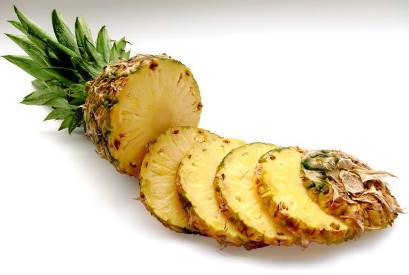
While there are some benefits to feeding pineapple to your chickens, there are also some things you should watch out for. Here are three things to keep in mind when providing this tasty treat.
High Sugar Content
Pineapple is high in sugar, so feeding it to your chickens too often could make them overweight or obese. As with any treat, moderation is key here. Make sure you only give your chickens a few small pieces at a time and limit their access to other sugary foods like candy or processed snacks.
Risk of Intestinal Blockage
The core and peel of pineapples contain fibers that can cause intestinal blockage in chickens if consumed in large amounts. Therefore, removing these parts before giving them to your birds or just avoiding them altogether is best. If you decide to give the core and peel, make sure they are cut into small pieces so they can digest them more easily and without risk of blockage.
Pesticide Residue
When purchasing pineapple for your chickens, ensure it is organic and free from pesticide residue. Pesticides can be dangerous to your chickens and make them very sick, so it’s important to buy safe produce.
How often should chickens eat pineapple?
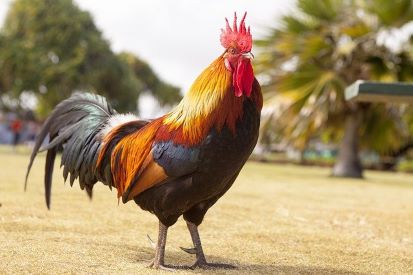
While pineapples are a delicious and nutritious treat for chickens, they should not be eaten daily. No more than 10% of their diet should consist of fruits and vegetables.
As such, feeding your chickens pineapple should be done in moderation – aim to give pineapple as an occasional treat so that your flock can enjoy all the goodness that comes with this sweet snack without risking an unhealthy diet and potential nutritional deficiencies.
A good rule of thumb is to think of pineapple or any fruit/vegetable as something special that can provide a little extra nutrition rather than making up their daily intake. Taking great care of your chickens means always providing them with a balanced diet.
How to prepare pineapple for feeding to chickens
Pineapple is a delicious, nutritious snack for chickens. However, there are some steps you should take before feeding your chickens pineapple, so read on to learn how to prepare pineapple for your flock.
Wash First
Before you feed your chickens any fruit or vegetable, you must wash it first. This will help remove any dirt, bacteria, or pesticides that may be present on the surface of the fruit. Run your pineapple under cold water and use a soft cloth or brush to remove debris.
Remove the Core and Rind
Chickens should not eat either the hard core or the rind of a pineapple. The core is too tough for them to digest properly, and it could cause digestive problems if ingested.
The rind also contains compounds not easily digested by chickens, so it should also be removed. Use a sharp knife to carefully cut away both the core and rind from the flesh of the pineapple.
Check For Ripeness
You must ensure your pineapple is neither unripe nor overripe before feeding it to your chickens. Unripe pineapples contain enzymes that irritate their digestive system, while overripe ones may have spoiled or developed mold – both are bad news for your flock!
Select ripe pineapples with golden-yellow skin and gently feel them; they should be slightly soft but firm when touched.
Chop Into Small Pieces
Once you’ve washed and prepared your pineapple according to the steps above, chop it into small pieces with a sharp knife or kitchen scissors before feeding it to your chickens. Doing this will make it easier for them to swallow and digest their snack.
Remove Any Uneaten Pieces
Lastly, watch your chickens while they feast on their fruity treat. If they leave behind any uneaten pieces of pineapple, be sure to remove them from their enclosure as soon as possible; otherwise, these pieces could attract pests like ants or rats into their habitat, which is something we want to avoid.
Can baby chickens eat pineapple?
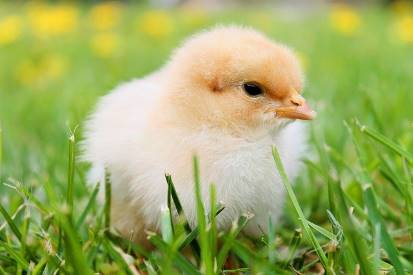
Caring for baby chicks is an exciting and rewarding experience, but it can also be challenging if you are unsure what your babies can or cannot eat. When it comes to pineapple, the answer might surprise you.
While baby chickens can certainly eat pineapple in small amounts, you should be mindful of its sugar content. Adult chickens benefit from a higher tolerance for these sugary fruits and vegetables, while baby chickens may not cope. Therefore, moderation is key when feeding your chicks pineapple.
Can chickens eat the rind of pineapple?
While chickens may find the pineapple rind to be an enticing treat, it is not a good idea for them to eat this part of the fruit.
Chickens tend to have relatively delicate digestive systems, and eating something as tough and fibrous as a pineapple rind can cause indigestion or worse. Therefore, it’s best to avoid feeding chickens the rind of pineapple altogether.
What other fruits can chickens eat?
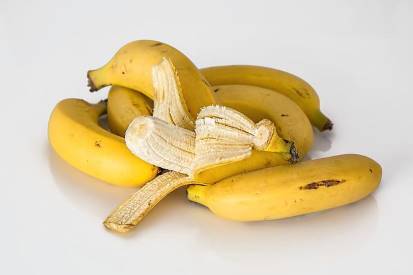
Pineapple is a popular choice, but chickens can enjoy a variety of fruits. So let’s explore additional fruit options that make tasty treats for your feathered friends.
Bananas
Bananas are full of nutrients and provide an excellent source of energy. They contain many vitamins and minerals, such as potassium, calcium, and vitamins A and C.
To feed this delicious treat to your chickens, mash it up or cut it into slices so they can easily eat them.
Read More: Can Chickens Eat Bananas? 6 Awesome Benefits
Papaya
Papaya is an excellent source of vitamins A and C, making it especially beneficial for egg-laying hens. In addition, this sweet fruit also contains several other essential nutrients like magnesium and potassium, which also provide health benefits for chickens.
Papaya should be cut into small pieces before being offered to your chickens.
Read More: Can Chickens Eat Papaya? 5 Fantastic Benefits
Dragon fruit
Dragon fruit is full of antioxidants and dietary fiber, which helps support the digestive system in chickens and provides them with added energy. However, it’s important to note that dragon fruit should only be fed in moderation because its high sugar content can cause health problems if eaten too often.
Cut the dragon fruit into small cubes before offering it to your flock – they will love the sweet taste.
Read More: Can Chickens Eat Dragon Fruit? 4 Awesome Benefits
Persimmons
Persimmons are an excellent source of vitamin A, vitamin C, and dietary fiber, which supports overall digestive health. Persimmons should be fed in moderation due to their high sugar content, but when fed in small amounts, they can be an excellent treat for your flock.
Cut the persimmons into slices or cubes before feeding them to your chickens so they can easily eat them.
Read More: Can Chickens Eat Persimmons? 5 Amazing Benefits
Jackfruit
Jackfruit is loaded with vitamins and minerals like iron, zinc, magnesium, and phosphorus, which all help promote healthy growth in chickens. Jackfruit should be cut into small pieces before being offered so the birds can easily consume it without any problems.
Read More: Can Chickens Eat Jackfruit? 4 Excellent Benefits
Can chickens eat pineapple – final thoughts
Feeding your chickens pineapple can be a great way to give them a tasty treat with many nutritional benefits. Just remember to give them only the fleshy part of the fruit and only occasionally, as too much sugar is not good for them.
With this knowledge, you are ready to safely provide your feathered friends with some delicious pineapple snacks.
Read More:
